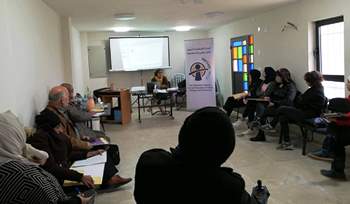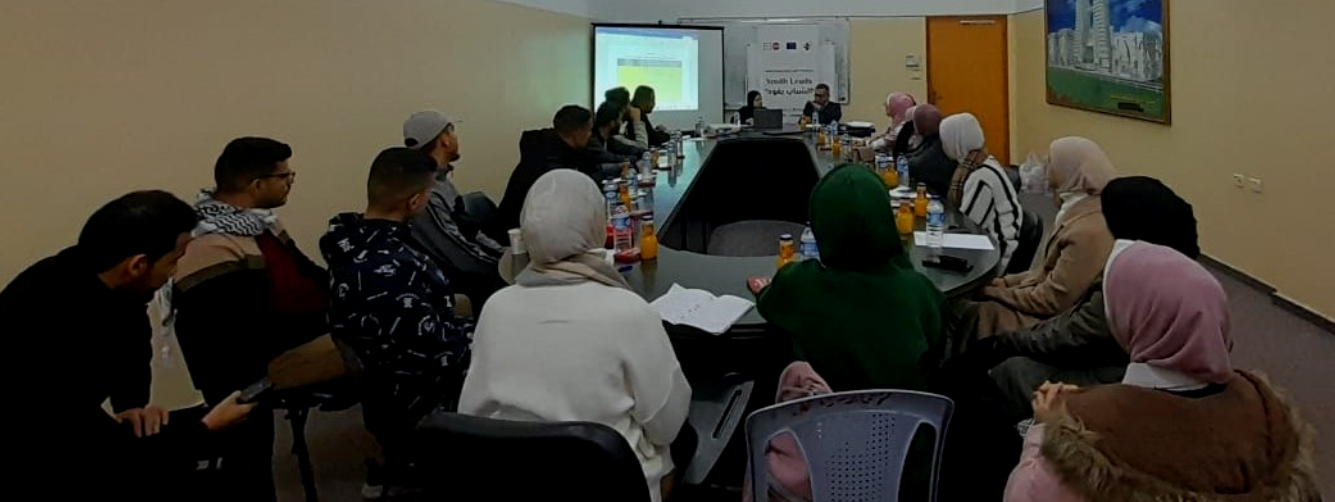
MIFTAH recently capped off a series of public sessions in three districts: Nablus, Hebron and Bethlehem, in which the results of a factsheet prepared by MIFTAH on the gaps in the National Referral System for battered women with disabilities were presented and discussed. The objective of the sessions was to address recommendations to influence policy formulation and procedures related to the National Referral System, “Takamul”, especially for women and girls subject to gender-based violence with a focus on protecting and empowering women with disabilities. The sessions were attended by several official and civil society organizations in addition to persons with disabilities.
The factsheet showed the gaps in the system at several levels, most importantly the absence of a law that regulates the work of the National Referral System, whereby the one in place does not rise to the level of binding laws in spite of its ratification by the Cabinet; in addition, Article 29 in the system prohibits the reception of women and girls with disabilities (mental and motor) in protection centers and shelters. Also, the system’s buildings and spaces are not compatible, which hinders the access of women with disabilities to services, in addition to the lack of service-providers capable of communicating with women with disabilities, especially the hearing and visually impaired. Moreover, there is a decrease in the level of awareness and cognitive empowerment among women with disabilities regarding their rights.
The participants showed special interest in the factsheet’s data and findings regarding the situation of women with disabilities and on ways to provide protection and support for them.
In this context, Narmin Al Koni from Nablus said in her evaluation of the session: “We expect the paper’s results will have an impact by raising awareness on the issue of women with disabilities and on ways to deal with them at the official and community levels and that some of our demands will be taken into consideration such as: women with disabilities must be included in the National Referral System; the rehabilitation of professional teams in the various ministries and institutions that deal with disabled persons and their training on how to deal with this sector of women; adaptation of spaces, reception rooms and shelters to be accessible and compatible with the needs and requirements of women with disabilities; and the need to handle cases that receive assistance with confidentiality.”
Samer Al Natsheh from Hebron, said: “The fact sheet included things that we, as disabled persons, did not know about; we were astonished by the data, which we didn’t expect.” He continued, “I think it is imperative that we benefit from the factsheet and its findings and that all relevant parties cooperate to implement the recommendations and work towards raising public awareness on them.”
MIFTAH project coordinator Hanan Said maintained that the sessions are part of the project, “Inclusive Action in GBV Programing in Emergencies”, which MIFTAH implements with support from the International Rescue Committee (IRC). It is also part of MIFTAH’s strategic approaches in promoting a legislativeenviornment and influencing public policies to safeguarding of citizens’ rights. She said MIFTAH works towards promoting women’s access to protection services by fostering the dialogue on the “Takamul” national referral system. In this context, she said in 2019, MIFTAH conducted a survey on the gaps in the National Referral System, to what extent it is being implemented and the challenges it faces, which impact its operational procedures and hinder women’s access to protection services.
These sessions are considered a continuation of MIFTAH’s approaches in pressing for adequate implementation of the system and the need to advocate towards the inclusion of an additional protocol that guarantees protection for battered women, especially women and girls with disabilities.








